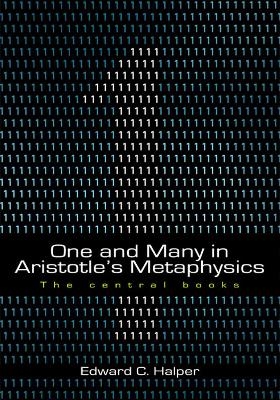
One and Many in Aristotle's Metaphysics: The Central Books
The Central Books
Seiten
2005
Parmenides Publishing (Verlag)
978-1-930972-05-6 (ISBN)
Parmenides Publishing (Verlag)
978-1-930972-05-6 (ISBN)
- Titel z.Zt. nicht lieferbar
- Versandkostenfrei
- Auch auf Rechnung
- Artikel merken
The problem of the one and the many is central to ancient Greek philosophy, but surprisingly little attention has been paid to Aristotle's treatment of it in the Metaphysics. "The Central Books of the Metaphysics" are widely recognised as the most difficult portion of a most difficult work. This title aims to examine the "Central Books".
The problem of the one and the many is central to ancient Greek philosophy, but surprisingly little attention has been paid to Aristotle’s treatment of it in the Metaphysics. This omission is all the more surprising because the Metaphysics is one of our principal sources for thinking that the problem is central and for the views of other ancient philosophers on it.
The Central Books of the Metaphysics are widely recognized as the most difficult portion of a most difficult work. Halper uses the problem of the one and the many as a lens through which to examine the Central Books. What he sees is an extraordinary degree of doctrinal cogency and argumentative coherence in a work that almost everyone else supposes to be some sort of patchwork. Rather than trying to elucidate Aristotle’s doctrines—most of which have little explicitly to do with the problem, Halper holds that the problem of the one and the many, in various formulations, is the key problematic from which Aristotle begins and with which he constructs his arguments.
Thus, exploring the problem of the one and the many turns out to be a way to reconstruct Aristotle’s arguments in the Metaphysics. Armed with the arguments, Halper is able to see Aristotle’s characteristic doctrines as conclusions. These latter are, for the most part, supported by showing that they resolve otherwise insoluble problems. Moreover, having Aristotle’s arguments enables Halper to delimit those doctrines and to resolve the apparent contradiction in Aristotle’s account of primary ousia, the classic problem of the Central Books. Although there is no way to make the Metaphysics easy, this very thorough treatment of the text succeeds in making it surprisingly intelligible.
Halper's One and Many in Aristotle's Metaphysics: The Central Books was originally published in 1989 by Ohio State University Press. The reprint of this work includes a new Introduction by the author.
Further, The Central Books is part of a Trilogy whose two other as of yet unpublished works Alpha—Delta and Iota—Nu will be released by Parmenides Publishing in 2008 and in 2014 respectively.
The problem of the one and the many is central to ancient Greek philosophy, but surprisingly little attention has been paid to Aristotle’s treatment of it in the Metaphysics. This omission is all the more surprising because the Metaphysics is one of our principal sources for thinking that the problem is central and for the views of other ancient philosophers on it.
The Central Books of the Metaphysics are widely recognized as the most difficult portion of a most difficult work. Halper uses the problem of the one and the many as a lens through which to examine the Central Books. What he sees is an extraordinary degree of doctrinal cogency and argumentative coherence in a work that almost everyone else supposes to be some sort of patchwork. Rather than trying to elucidate Aristotle’s doctrines—most of which have little explicitly to do with the problem, Halper holds that the problem of the one and the many, in various formulations, is the key problematic from which Aristotle begins and with which he constructs his arguments.
Thus, exploring the problem of the one and the many turns out to be a way to reconstruct Aristotle’s arguments in the Metaphysics. Armed with the arguments, Halper is able to see Aristotle’s characteristic doctrines as conclusions. These latter are, for the most part, supported by showing that they resolve otherwise insoluble problems. Moreover, having Aristotle’s arguments enables Halper to delimit those doctrines and to resolve the apparent contradiction in Aristotle’s account of primary ousia, the classic problem of the Central Books. Although there is no way to make the Metaphysics easy, this very thorough treatment of the text succeeds in making it surprisingly intelligible.
Halper's One and Many in Aristotle's Metaphysics: The Central Books was originally published in 1989 by Ohio State University Press. The reprint of this work includes a new Introduction by the author.
Further, The Central Books is part of a Trilogy whose two other as of yet unpublished works Alpha—Delta and Iota—Nu will be released by Parmenides Publishing in 2008 and in 2014 respectively.
Edward C. Halper graduated from the University of Chicago, USA and went on to receive his Ph.D. from the University of Toronto. He is the Josiah Meigs Distinguished Professor of Philosophy at the University of Georgia, and author of Form and Reason: Essays in Metaphysics (1993), One and Many in Aristotle's Metaphysics: The Central Books (1989, 2005), and One and Many in Aristotle's Metaphysics: Iota-Nu (2014).
| Verlagsort | Las Vegas |
|---|---|
| Sprache | englisch |
| Maße | 17 x 24 mm |
| Themenwelt | Geisteswissenschaften ► Philosophie ► Metaphysik / Ontologie |
| Geisteswissenschaften ► Philosophie ► Philosophie Altertum / Antike | |
| ISBN-10 | 1-930972-05-9 / 1930972059 |
| ISBN-13 | 978-1-930972-05-6 / 9781930972056 |
| Zustand | Neuware |
| Haben Sie eine Frage zum Produkt? |
Mehr entdecken
aus dem Bereich
aus dem Bereich
Buch | Hardcover (2024)
Matthes & Seitz (Verlag)
CHF 41,90
Über konstruktivistisches Denken in der Theologie
Buch | Softcover (2024)
Verlag Herder
CHF 79,95


